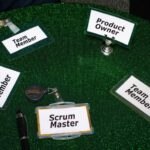The qualities of ‘scrum' team leaders
Managing processes and people can be one of the most challenging tasks for any organization. It requires not only making the most out of the available resources, but also optimizing time, coordinating the team, defining action protocols and assigning tasks. And when all this has to be carried out in the context of challenging projects developed in dynamic environments, the most common option is to resort to the so-called scrum methodology. So, what qualities do the people leading these work groups have to bring to the team?

Agile methodologies emerged as a result of the lack of planning that all too frequently undermines projects and companies. Cost-overruns, unmet deadlines, poor excuses before customers or other department…. a growing number of companies are becoming increasingly aware of the need to implement a new work methodology.
Implementing scrum requires a deep understanding of the work methods used and a healthy dose of patience
It is time to unify tools, unify processes and leverage synergies to save time and money and boost, as ultimate goal, the team’s motivation. Without a doubt, this has become a matter of vital importance which requires a deep understanding of the work methods used and a healthy dose of patience for their implementation. But, what type of persons are ready to lead these agile work teams?

Leading a ‘scrum’
The ‘scrum’ methodology is the most broadly used agile development model, and is a system that has proven effective in particularly complex or high-risk projects, whose scope is defined on the go, and team members cooperate closely and share the responsibility over the project’s results.
To ensure a smooth running of the project, the scrum methodology bypasses the traditional role of the leader, establishing three perfectly differenced roles: the ‘product owner’, the ‘scrum’ master and the ‘scrum’ team. The first two are the ones responsible for, so to speak, leading the project, each with highly differentiated functions.
‘Product owner’, the ROI watchdog
The product owner is the person authorized to make decisions regarding the project’s characteristics. This person represents the customer or department that issued the order. Its functions include channeling business needs, listening to all parties involved, and turn what these parties demand into value goals. Also, the product owner is responsible for the economic part, making sure that an acceptable return on investment (ROI) is achieved.
The ‘product owner’ has to make sure that an acceptable return on investment (ROI) is achieved
Also, this person frequently reviews the project to ensure that it stays on the right track and suggests improvements, if any, to contribute the maximum value that the company requires, the service, the product…
The qualities that a product owner needs to bring to the project include solid communications skills, an in-depth knowledge of the sector and, of course, a good eye for business.

‘Scrum’ master, the orchestra conductor
These work methods require a responsive team manager that acts as facilitator, someone capable of orchestrating the team, setting the right beat and the right tempo. In ‘scrum’ methodologies, this person is known as the ‘scrum’ master, the soul of the team.
More than a leader, this person is a neutral facilitator who is responsible for promoting and preaching the principles. When properly implemented, the master not only conveys the methodology’s principles to all members of the team, but also makes sure that each person acts in accordance with the role that has been assigned to them. Thus, the ‘product owner’ cannot act on behalf of the team. And the same goes the other way around. One of the Scrum master’s key responsibilities will be making sure that this does not happen.
So, the ‘scrum’ master should be a conflict-solving specialist, capable of overcoming any grievances that may be holding the project back. The master is also responsible for keeping the ‘scrum team’ motivated by building a collaborative work atmosphere, promoting self-management and preventing third-party interference.
Someone has to orchestrate the team, setting the right beat and the right tempo: a ‘scrum’ master, the driving force behind the ‘scrum’
A good ‘scrum’ master should know the ‘scrum’ methodology by heart, of course. A desire to help and altruistic personality, great problem-solving skills, an ability to coach and teach, and a strong personality to mediate between the product owner and the team are other essential traits that distinguish great ‘scrum’ leaders.
If you are interested in this type of topics and other related to talent, follow BBVA in LinkedIn If you are interested in new career opportunities, visit our BBVA Careers page.